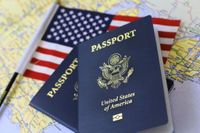In a worrying trend, travelers from Germany and the United Kingdom are facing detainment and deportation upon attempting to enter the United States, raising serious concerns about U.S. border policies. In recent months, multiple German citizen cases have come to light, highlighting the increasing scrutiny foreign nationals are receiving at U.S. borders under the Trump administration. Immigration and Customs Enforcement (ICE) has been reported detaining individuals without clear justification, leaving many to wonder about the implications of their travel plans.
A notable case involves Fabian Schmidt, a 34-year-old Green Card holder who was detained upon arrival at Logan Airport in Boston on March 7, 2025, after returning from Germany. Schmidt was reportedly interrogated for hours, deprived of basic necessities like food and water, and even denied his anxiety medication. His mother, Astrid Senior, described her son's harrowing experience to local media, expressing feelings of helplessness in this situation where her son, a lawful resident since 2007, was simply trying to re-enter the country.
According to Schmidt's lawyer, David Keller, neither he nor Schmidt has been provided with any formal reasons for his detention, which highlights a troubling pattern in the way ICE operates. John Gihon from the American Immigration Lawyers Association commented, “There is no legal limit for how long someone can be held in ICE detention without being made aware of formal charges.” This statement underlines the alarming reality for many individuals caught in ICE detention.
Similarly, Lucas Sielaff, a 25-year-old from Bad Bibra, Germany, was detained for two weeks after trying to enter the U.S. from Mexico, where he traveled to help his American fiancée with her sick dog. He recounted feeling “angry, sad, and afraid,” during his detention at an ICE facility in California, after border officials assumed he was violating the 90-day travel rule. After spending two weeks without any updates about his case, he was eventually deported back to Germany on March 6.
Jessica Brösche, a tattoo artist from Berlin, faced a similar fate when she attempted to cross into the U.S. from Mexico on January 15, 2025. Detained for six weeks due to suspicions surrounding her tattoo equipment, she was deported back to Germany without any formal charges being filed against her.
These incidents are not isolated. Celine Flad, a 22-year-old university student, was held for an entire day before being sent back to Germany despite having a valid ESTA waiver. She described her experience to Der Spiegel, stating, “I was never told what the issue was,” despite having all necessary travel documents for her trip to New York and Miami.
The increasing number of such cases has prompted Germany's Foreign Ministry to issue a travel advisory for its citizens. The advisory warns that holding a U.S. visa or an ESTA authorization no longer guarantees entry into the United States. It reflects growing concerns over the treatment of German travelers, emphasizing the high discretion that American border officials hold in determining who is allowed entry.
Likewise, the United Kingdom’s Foreign, Commonwealth and Development Office (FCDO) has updated its guidelines for British citizens traveling to the U.S. They stress the importance of compliance with U.S. entry regulations, warning that failure to do so could result in detention or arrest.
The alarming border policies and the situation for foreigners at U.S. ports of entry have caused global backlash, with critics describing the environment as harsh and unpredictable. The Trump administration’s stringent measures have led to a significant increase in detentions, raising questions regarding their necessity and legality.
Reports of a British woman named Rebecca Burke who was detained for three weeks due to a visa mix-up have added to the international outcry. After an ordeal that left her in unwelcoming conditions at an immigration detention center, she was finally able to return to the UK, highlighting the distressing experiences faced by many travelers.
In response to these developments, more countries are advising their citizens to exercise caution when planning travel to the U.S. The updated travel advisories reflect a growing concern among governments regarding the treatment of their nationals in the U.S. under the current administration’s immigration policies.
As the situation continues to evolve, the implications for the travel industry are profound, with concerns over reduced bookings and a decline in international tourism. The tightening of U.S. border controls has led to increased uncertainty, prompting travelers to become more cautious about entering the U.S. altogether.
Travel advisors are encouraging potential visitors to meticulously check documentation, adhere strictly to entry requirements, and remain aware of any changes to U.S. border policies ahead of their trips.
With the overall landscape of international travel shifting dramatically, Americans and their foreign guests alike grapple with the practical realities of this increasingly complicated environment.



